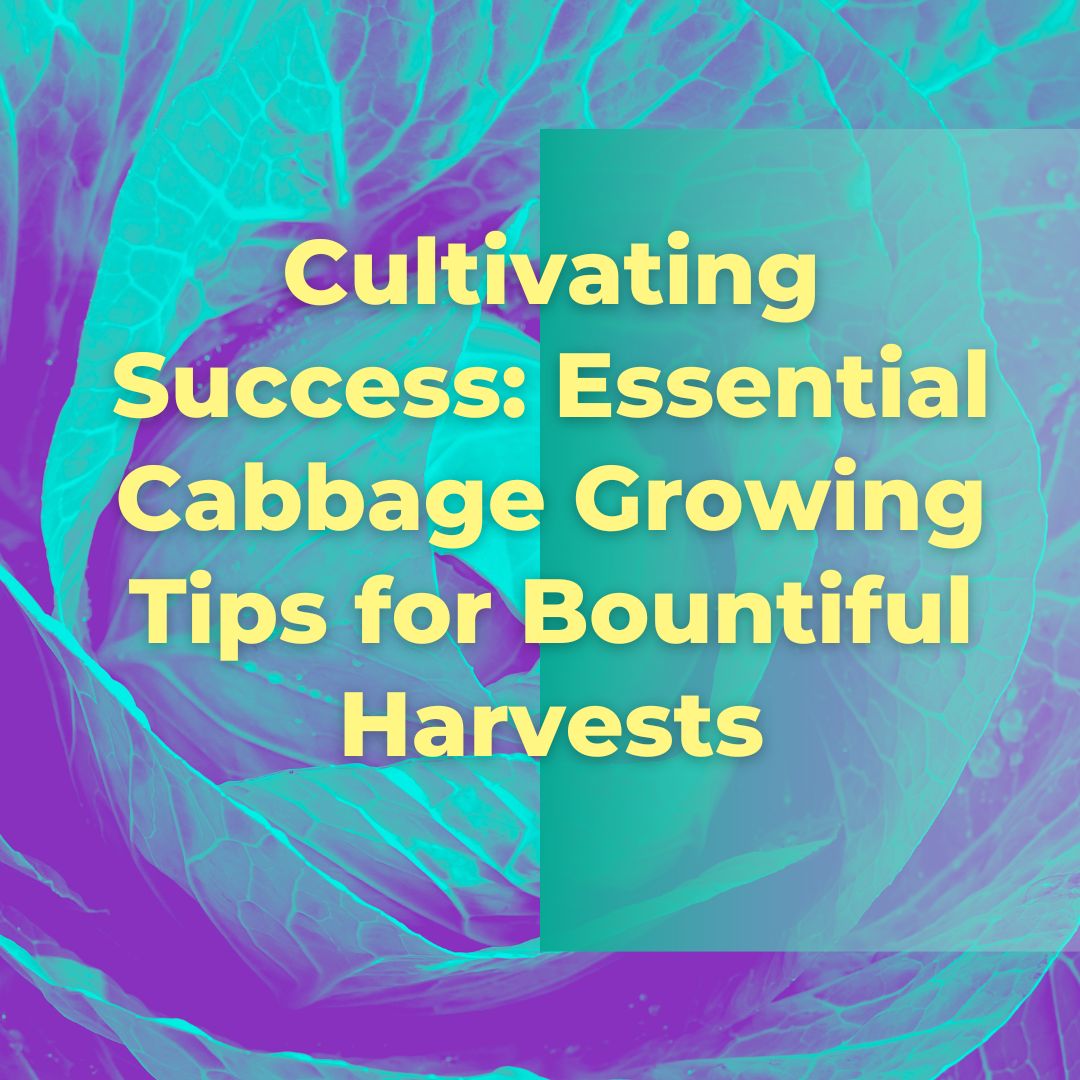
Cultivating Success: Essential Cabbage Growing Tips for Bountiful Harvests
Share
Growing Cabbage:
- How to Grow Cabbage:
Soil: Cabbage prefers well-drained, fertile soil with a slightly acidic to neutral pH.
Sunlight: Cabbage needs full sun, at least 6 hours of direct sunlight per day.
Temperature: Cabbage prefers cooler temperatures and can tolerate light frosts.
Watering: Keep the soil consistently moist but not waterlogged.
Spacing: Plant cabbage seedlings about 12-24 inches apart, depending on the variety.
2. When to Grow Cabbage:
Spring Planting: Start seeds indoors 6-8 weeks before the last expected frost date, then transplant outdoors after the danger of frost has passed.
Fall Planting: Directly sow seeds or transplant seedlings in late summer for a fall harvest.
3. Why Grow Cabbage:
Nutrient-Rich: Cabbage is a good source of vitamins C and K, and it also contains fiber and antioxidants.
Versatile in Cooking: Cabbage can be used in various dishes, from salads and slaws to soups and stir-fries.
Storage: Cabbage can be stored for an extended period, making it a reliable addition to your homegrown produce.
Benefits of Cabbage:
Nutritional Value:
Cabbage is rich in vitamin C, which supports the immune system. It contains vitamin K, essential for blood clotting and bone health. The vegetable is low in calories and a good source of dietary fiber.
Digestive Health:
Cabbage is known for promoting digestive health due to its fiber content. It can help prevent constipation and maintain a healthy digestive tract.
Heart Health:
Cabbage may contribute to heart health by helping to lower cholesterol levels. It contains compounds that may have anti-inflammatory and blood pressure-lowering effects.
Cancer Prevention:
Some studies suggest that cabbage, along with other cruciferous vegetables, may have cancer-fighting properties.
Household Remedies:
Cabbage Leaves for Inflammation:
Applying cabbage leaves to swollen or inflamed areas may help reduce inflammation and soothe discomfort.
Cabbage Juice for Ulcers:
Fresh cabbage juice is sometimes used as a home remedy for peptic ulcers, as it may have a protective effect on the stomach lining.
Cabbage Poultice for Chest Congestion:
Creating a poultice with cabbage leaves and applying it to the chest can help relieve congestion during colds or respiratory issues.
Cabbage Compress for Joint Pain:
Wrapping cabbage leaves around affected joints may provide relief from joint pain and inflammation.
Remember to consult with a healthcare professional before relying solely on home remedies for serious health conditions. While cabbage offers numerous benefits, individual responses can vary, and professional advice is essential for personalized care.
Mastering the art of cabbage growing can be rewarding for several reasons:
Self-Sufficiency:
Growing your own cabbage allows you to be more self-sufficient and less dependent on store-bought produce. This can contribute to a more sustainable and resilient lifestyle.
Cost Savings:
Homegrown vegetables can save you money in the long run. Once you've mastered cabbage growing, you can produce a significant amount of this nutritious vegetable at a fraction of the cost of buying it regularly.
Quality Control:
When you grow your own cabbage, you have control over the cultivation process. You can choose organic methods, avoid pesticides, and ensure the highest quality and freshness for your produce.
Health Benefits:
Homegrown cabbage is likely to be more nutritious than store-bought varieties. You have control over the soil, fertilizers, and growing conditions, leading to a potentially higher nutrient content in your cabbage.
Gardening Skills:
Mastering cabbage growing contributes to your overall gardening skills. You'll gain experience in soil preparation, planting, pest management, and harvesting, which can be applied to other vegetables and plants.
Connection with Nature:
Gardening, including cabbage growing, provides an opportunity to connect with nature. Observing the growth cycle of plants and being involved in the nurturing process can have positive effects on mental well-being.
Educational Value:
Growing cabbage can be an educational experience, especially if you involve children or others in the process. It offers insights into plant biology, ecology, and the importance of sustainable food practices.
Variety and Unique Cultivars:
Mastery of cabbage growing allows you to experiment with different varieties and cultivars. You can explore unique and heirloom varieties that may not be readily available in supermarkets.
Sharing and Community:
Excess cabbage can be shared with friends, family, or neighbors, fostering a sense of community. Sharing homegrown produce can create connections and strengthen community bonds.
Hobby and Enjoyment:
For many people, gardening is a fulfilling and enjoyable hobby. Mastering cabbage growing can be a satisfying and relaxing activity, providing a sense of accomplishment and joy.
Whether you're a seasoned gardener or just starting, mastering cabbage growing can be a fulfilling journey that not only yields tangible benefits but also contributes to a healthier and more sustainable lifestyle.
